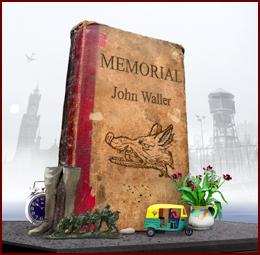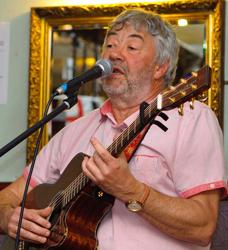Notes on the Songs NOTES ON THE SONGS 1. Eastern Border (JW)
This is ostensibly about the division between eastern and western Europe in the cold war era - and I did myself decide, in 1970, to take a year in Yugoslavia, and make Communist eastern Europe the focus of my academic interest for the next six years. But the song is actually about making a more radical, permanent and maybe even perverse life decision; rejecting existing comforts in return for an uncertain and maybe harsher future. 2. Memorial (JW)
The war memorial that inspired this essay in urban decay is actually in Queensbury; where one might turn off to the vet on a grim Tuesday in February, with a dying cat. It isn't necessarily about Bradford, but if it were, the irony is that even Bradford's Central Library has been closed down. 3. Sun Goes Down (JW)
This is a complex song, with apparently unrelated elements; but there are threads, and links, and consequences, and conclusions. It contrasts how we like to see ourselves, how others see us; and what certain attitudes can lead to. It goes down far better with my Dutch and Danish colleagues, who are perhaps better able to see us English objectively, than it does in the UK. It was runner-up in the UK's National Political Song-writing Competition in 2009. 4. Paneriai (JW)
The pine woods of Paneriai, just outside Vilnius, were the location for the mass execution of approximately 100,000 people by the Nazis between 1941 and 1944. The victims were mostly the Jews of Lithuania and surrounding countries, but also included a fair number of Roma and Russian prisoners of war. Up until the Nazi invasion of the Baltic States, the idea of the "final solution" had not been fully developed - this was the start of it; with, it has to be said, some collaboration by the local population. I hope the song speaks for itself. 5 Be Something (JW)
Just a tune I often play to get my fingers warmed up. What's that called? I was once asked. Oh, it isn't anything, really, I responded. It must be something, came the rejoinder. And so, now it is. Of course, its structure reflects the fact that when I was learning guitar back in the late 60s, everybody but everybody was trying to play Davy Graham's "Anji". 6. Parallel Lives (JW)
I spent over twelve months in India between 2007 and 2013; in a series of 26 two-week work visits, taking in 20 of the country's biggest cities. But the idea for this came on my second day in India. The tuk-tuks are everywhere, but these were in Hyderabad: the beggar was in Chennai, and the whole song was forged a year later in Bangalore. However much you travel in India, you are still in your foreigner's bubble. 7. Boar of Bradford (JW)
This is mostly historically accurate. However, I have changed at least one character's name, and some of the locations, for modern comic effect. It is not recorded who made the crucial observation that avoided a miscarriage of justice: so it just might have been a serving-wench. The Lord of Bradford Manor at the time was John of Gaunt, who went on to sire (indirectly) every King and Queen of England since. Primarily, it is a dramatic song, which works best when sung while leaping round the audience identifying unsuspecting listeners as protagonists in the action. 8. Routine (JW)
This song has been six years in the gestation, and may still not quite be "there". One of the few songs I have written where the chords came first, and the lyrics followed on as suggested by the rhythm. 9. Kerguelen (JW)
The premise behind this song is that the Captain of the missing flight MH370, which set off from Kuala Lumpur for Beijing but mysteriously was last tracked heading south off the west coast of Australia, hijacked his own plane (as we now know is possible); and was heading for the most isolated place in the world. These islands are fascinating in their own right - in the southern Indian Ocean, almost equidistant between Australia, South Africa and Antarctica. They are half the size of Yorkshire; but even wilder and more desolate, with no permanent inhabitants. 10. Mary Ann (JW)
An attempt at a 60's-style rabble-rousing protest-demo song. The melody is easy to pick up (and may not be entirely original), and the lyrics could be adapted to fit any situation where one might need to get a crowd going. The Mary Ann to which it refers was, and still is, quite opposed to any sort of violence, hence the final verse. 11. Shah of Shahs (Al Stewart)
Al Stewart remains my bedrock singer/songwriter influence. So here is another cover. It relates to the toppling of the Shah of Iran / Persia, and his replacement by the Ayatollah Khomeini, in 1979. But it probably could probably illustrate the fate of any number of dictators anywhere. 12. Cartway (JW)
Set in Bridgenorth, Shropshire: for several centuries a major river port for trows (barges) which were sailed up the Severn, and pulled over the occasional shallows by teams of eight men. They must have had shanties! The Cartway itself is a still-extant winding road from the port area to the High Town, though it now only has one single Inn instead of the fifty or so such that served the hungry, thirsty and libidinous men who worked the river at the time. In due course the teams of human pullers were replaced by horses, then railways, and now road transport. Bridgenorth remains a great place to visit. 13. Endgame (JW)
It is useful sometimes just to play around at random on the guitar, trying odd chord combinations, finger-style variations; and then parking anything that sounds halfway decent until a suitable song comes along. This one just happened as I was completing the set-list for the CD. Maybe one day it will be something else, maybe not. All tracks written and performed by John Waller © 2015 except # 11: Shah of Shahs: written by Al Stewart, performed by JW Recorded by John Waller (and Nicholas Waller for 1, 6, 7, 12) Cover Design by Nicholas Waller; photograph of John Waller by Andrew Pick
| 
